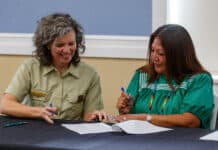The program has a catchy name designed to lend a helping hand to Mother Nature.
Plants for the Planet is the brainchild of Healthy World Sedona founders Don Fries and Bev Bow, who came up with the idea as a way for the for the local community to come together for a cause. It was also a way to participate in the Sedona Sustainability Alliance’s Earth Day map promotion. Since it wasn’t really practical for HWS to have an event at a physical location, Fries and Bow were inspired to create this online-only event from the veganuary.com project that has been successful in Great Britain.
“Plants for the Planet is a pledge drive in support of a great cause, but with no cost to participate,” Jon Thompson, a member of the Sustainability Alliance said. “At the PfP web page, people pledge to eat no animal products for some number of days during Earth Month. They choose how many days. Our goal is 6,000 person-days pledged by the community.”
The website has a thermometer to illustrate the community’s daily progress toward that goal, as well as a calculator to show the various positive effects on several aspects of planetary health, he said. There are also several tips, recipes and suggestions for how to enjoy those plant-based days, either right on the page or as external links.
Thompson said that, in essence, a plant-based diet is the same as a vegan one. They both mean the elimination of all animal products from one’s diet and lifestyle.
“The term ‘vegan’ has odd connotations for some people, and ‘plant-based’ is more descriptive anyway, so it’s being used more and more these days,” he said.
Most people, Thompson said, are shocked to learn how much of the Earth’s resources are required to raise animals for food, especially when compared with the resources necessary to supply the same calories and far better nutrition through plant food.
“Over their lifetimes, the many billions of animals raised for food each year need lots of water and feed,” he said. “That depletes our rivers and aquifers and it results in precious forest land in the Amazon and elsewhere to be leveled for growing crops to feed those animals.”
The animals produce waste that finds its way into our waterways as pollution and they burp enormous quantities of methane, which is a planet-heating greenhouse gas many times more potent than carbon dioxide, he said. The relevant numbers most often cited are 1,100, 45, 30, 20 and 1. That is, for every single day that someone forgoes the standard American diet for a plant-based one, that person saves 1,100 gallons of water, 45 pounds of grain, 30 square feet of forest, 20 pounds of carbon dioxide equivalent and one animal’s life.
“When we ask what difference one person can make, that’s quite an impressive answer,” he said.
Thomspon, a former Sedona city councilman, practices what he preaches. He said he’s definitely healthier, which is a great bonus, given that his main motivation for going plant-based four years ago was to reduce his personal contribution to human-caused climate change.
“But, for me, the biggest surprise was the change in my mental attitude toward food,” he said. “I was always aware, in the back of my mind, that other sentient beings were being killed for my food, often after significant suffering, but I believed that this was necessary, so I didn’t let myself think about it. When I discovered it wasn’t necessary at all, it was like a weight was lifted that I hadn’t even realized was there. So, how has my life changed? I’m physically healthier, mentally happier and environmentally lighter.”
Some may hear “plant-based diet” and think that equates to eating salads three times a day. Thompson said that’s not the case. He said those who go plant-based realize quickly that they have lots of options. There are many foods in grocery stores that most people have never tried because they have been preparing and eating the same familiar things out of habit.
“They will also discover that there are lots of plant-based imitations of animal foods, which can be easily substituted in their recipes, if they want to make a more gradual transition,” he said. “And there are tons of plant-based cookbooks and websites with great tips. It’s strange how many people who hate being bored often don’t look at their plate as an opportunity to experience something new and exciting. A plant-based plate almost always has more colors, flavors and textures. It’s the opposite of boring.”
For more information on this program or other Earth Day events, visit vvearthday.com.
Ron Eland can be reached at 282-7795, ext. 122 or by email at reland@larsonnewspapers.com






















